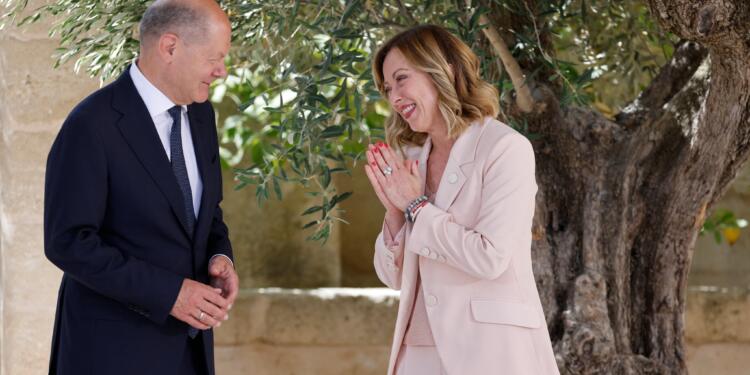Italy is currently hosting the 50th G7 Summit at Borgo Egnazia (Fasano) in Apulia, southern Italy, from June 13 to 15. Italian Prime Minister Giorgia Meloni made headlines on Thursday by greeting world leaders with a ‘namaste’—a traditional Indian gesture of respect with folded hands. Videos of Meloni’s gesture have quickly spread across social media platforms, drawing praise from netizens.
Meloni’s Namaste Gesture Goes Viral
This exchange exemplifies the cultural openness and diplomatic finesse crucial in international gatherings such as the G7. By embracing the ‘namaste’, a symbol of respect and unity in Indian tradition, Prime Minister Meloni effectively bridged cultural divides, showcasing a willingness to honor and engage with diverse customs. Such gestures not only foster goodwill among global leaders but also highlight the significance of cultural diplomacy in navigating complex geopolitical landscapes. In an era marked by global interconnectedness, these interactions underscore the value of mutual understanding and respect for cultural diversity as pillars of effective international relations.
Key Discussions at the G7 Summit
The ongoing G7 Summit in Italy has drawn significant attention to critical global issues, particularly the escalating conflict between Russia and Ukraine, and the recent flare-up of tensions involving Israel and Hamas.
Leaders from the United States, the United Kingdom, France, Italy, Germany, Canada, and Japan are actively engaged in robust discussions aimed at addressing these pressing challenges. The summit serves as a pivotal platform for these nations to strategize and coordinate efforts towards promoting peace, stability, and international cooperation amidst complex geopolitical dynamics.
Leaders Present at the Summit
On the inaugural day of the Summit, a prominent gathering of global leaders convened, including US President Joe Biden, French President Emmanuel Macron, Canadian Prime Minister Justin Trudeau, UK Prime Minister Rishi Sunak, and Japanese Prime Minister Fumio Kishida, alongside Italian Prime Minister Giorgia Meloni.
The agenda prominently featured discussions addressing the escalating conflict between Russia and Ukraine. Ukrainian President Volodymyr Zelensky’s presence underscored the urgency and gravity of the deliberations on international security and diplomatic resolutions amidst the ongoing crisis in the region.
Modi’s Arrival and Participation
Indian Prime Minister Narendra Modi arrived in Italy late Thursday night for his first international visit since commencing his third consecutive term following the 2024 Lok Sabha elections. His participation in the G7 outreach session on Friday signifies India’s proactive engagement on global issues.
Modi’s agenda includes bilateral discussions with key world leaders, underscoring India’s commitment to fostering diplomatic relations and addressing shared challenges. These interactions are pivotal in strengthening India’s strategic partnerships and advancing mutual interests across diverse sectors including trade, security, and technology. The meetings are expected to lay the groundwork for collaborative initiatives that will promote stability and prosperity on the international stage.
Bilateral Interactions
During his visit, Modi is expected to discuss bilateral and global issues with key leaders such as US President Joe Biden, UK Prime Minister Rishi Sunak, French President Emmanuel Macron, Japanese Prime Minister Fumio Kishida, and German Chancellor Olaf Scholz.. These discussions are crucial for fostering stronger ties and addressing pressing global challenges. Additionally, there is speculation surrounding a possible meeting between Modi and Ukrainian President Volodymyr Zelensky, underscoring the importance of regional stability and international cooperation in resolving ongoing conflicts.
Impact of Meloni’s Gesture
Meloni’s adoption of the ‘namaste’ gesture not only symbolizes cultural respect but also underscores the broader implications of India’s diplomatic strategy under Modi’s leadership. By incorporating this traditional Indian greeting into international forums like the G7 Summit, Meloni acknowledges and embraces India’s cultural richness while promoting a message of inclusivity and mutual respect.
This gesture serves as a testament to India’s expanding influence in global affairs, where cultural diplomacy plays an increasingly pivotal role. It enhances India’s visibility and credibility on the world stage, positioning the nation as a bridge between diverse cultures and reinforcing its status as a significant player in international relations.
ALSO READ: Why has India been invited again to the G7 summit?

























